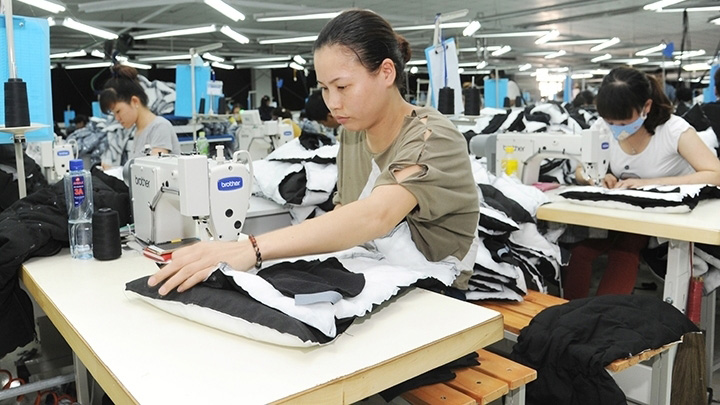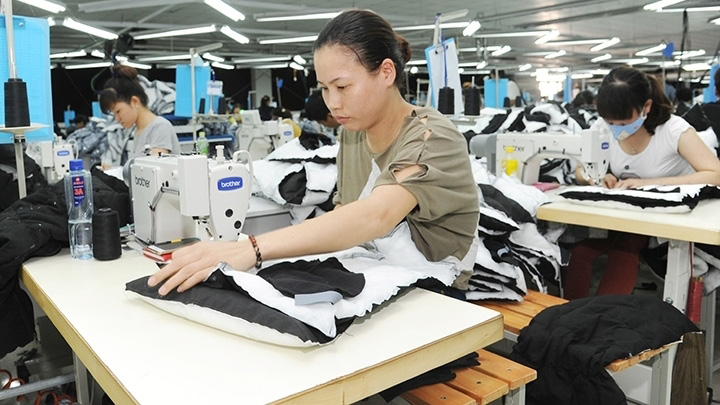
Exports have continued to be a spotlight in the economic picture this year. However, it requires sound strategies from enterprises and State management agencies to make Vietnamese exports closely connected to global value chains and have higher added values towards sustainable export growth.

A sewing factory of Bac Giang Garment JSC in Bac Giang city (Photo: Tran
Giang)
Economists said that 2017 marked the first year that Vietnam's
export revenue hit US$214 billion and the export revenue in 2018 is anticipated
to remain high due to the implementation of international economic commitments
which will help to reduce export taxes.
In addition, the efforts of the
Government, ministries and localities to reform administrative procedures and
create a favourable business environment will also contribute to facilitating
domestic production and business activities, thus, creating momentum for
exports.
However, Vietnam is still encountering a
number of problems, causing difficulties to export activities. Economist Pham
Chi Lan said that Vietnam has successfully integrated into many global value
chains, but has mainly engaged in industrial production activities in the final
stage with low added value and weak links between domestic enterprises.
In particular, Vietnamese imports and
exports mainly depend on FDI enterprises (accounting for over 70% of total
import-export turnover), while the participation of domestic enterprises in
import-export activities remains insignificant with a lack of qualified
enterprises to join value chains.
There are currently approximately 300
enterprises qualified enough to take part in the supply chain, but they remain
at the level of providing spare parts, including 2% of large enterprises, 2%-5%
of medium enterprises, and the rest are small or micro-sized.
The problems of Vietnamese enterprises also include a lack of working and
management skills and technology innovations, in addition to difficulties in
accessing finance, making the production process of Vietnamese enterprises
unrelated to value chains. Moreover, the FDI's spill-over effect on domestic
firms remains negligible. Vietnam also lacks policies and infrastructure in
support of the connection between FDI and domestic sectors.
Vietnam has to make its choice between
continuing exports, with the focus on outwork and assembly with low added
values, and diversifying itself to join global value chains to gain higher
added value.
According to experts, in order to
increase the product value chain for sustainable export growth, Vietnam must
develop a comprehensive reform package concerning specific sectors, which must
be implemented under a comprehensive roadmap. In addition, enterprises need to
enhance their flexibility and ability to grasp market opportunities, while
actively improving their skills and management capacity toward higher
productivity and effective innovations.
Deputy Head of the Department of Export
and Import under the Ministry of Industry and Trade, Tran Thanh Hai, said that
there should be more comprehensive solutions toward sustainable exports
including promoting production, creating high quality sources of input for
exports, enhancing the added value of products, while continuing negotiations
on opening markets and strengthening measures to maintain stable export
markets.
Hai noted that it is also necessary to
complete the legal framework on export activities and build appropriate product
chains to increase values for export goods.
In order to create a legal framework for
sustainable export, the Prime Minister approved the project on enhancing the
competitiveness of Vietnamese export commodities by 2020, with a vision to
2030. One of the main solutions outlined in the project is to re-organise
domestic production through the transformation of production and export
methods.
The solutions will only be effective if domestic
enterprises actively develop their own solutions to improve their
competitiveness and corporate management to stand ready to join the global
playground as partners of large corporations across the world.
Source: NDO
According to data from the Hoa Binh Provincial Party Committee, the industrial production index for the first six months of 2025 is estimated to have increased by 20% compared to the same period last year. This marks the highest year-on-year growth rate for this period since 2020.
In the first six months of 2025, Hoa Binh province’s export turnover was estimated at 1.145 billion USD, marking an 18.11% increase compared to the same period in 2024. Import turnover was estimated at $ 804 million, a 17.15% increase, which helped the province maintain a positive trade balance.
The lives of the ethnic minority farmers in Tan Lac district have gradually improved thanks to the new directions in agricultural production. This is a testament to the collective strength fostered through the professional associations and groups implemented by various levels of the district’s Farmers’ Union.
With the motto the "product quality comes first,” after nearly one year of establishment and operation, Muong village’s Clean Food Agricultural and Commercial Cooperative, located in Cau Hamlet, Hung Son Commune (Kim Boi district), has launched reputable, high-quality agricultural products to the market that are well-received by consumers. The products such as Muong village’s pork sausage, salt-cured chicken, and salt-cured pork hocks have gradually carved out a place in the market and they are on the path to obtaining the OCOP certification.
In the past, the phrase "bumper harvest, rock-bottom prices" was a familiar refrain for Vietnamese farmers engaged in fragmented, small-scale agriculture. But today, a new spirit is emerging across rural areas of Hoa Binh province - one of collaboration, organisation, and collective economic models that provide a stable foundation for production.
Maintaining growing area codes and packing facility codes in accordance with regulations is a mandatory requirement for agricultural products to be eligible for export. Recently, the Department of Agriculture and Environment of Hoa Binh province has intensified technical supervision of designated farming areas and packing facilities to safeguard the "green passport" that enables its products to access international markets.



